Welcome to Jiangsu DZX Factory.
Email:dlx@dlx-alloy.com Mobile/Whatsapp:+86 199 0611 9641
Professional manufacturer of welding wires and spraying wires,over 22 years.
Welcome to Jiangsu DZX Factory.
Email:dlx@dlx-alloy.com Mobile/Whatsapp:+86 199 0611 9641
Professional manufacturer of welding wires and spraying wires,over 22 years.
Contact:Jason
Whatsapp:+8619906119641
Email:dlx@dlx-alloy.com
Add:NO.32 West Taihu Road, Xinbei District, Changzhou, Jiangsu,China
Nickel Welding Wire
Product Details
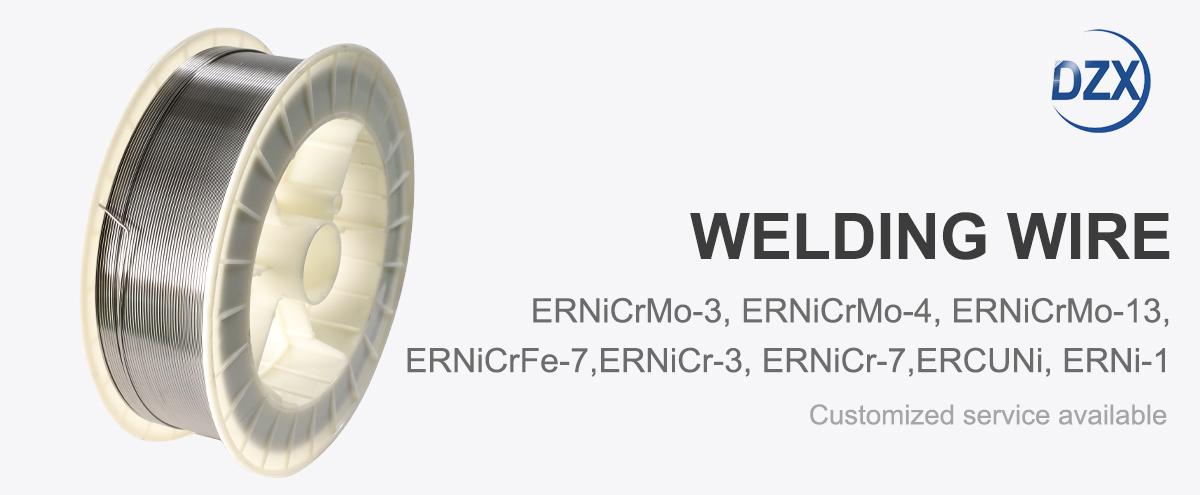
Our Durable Monel 400 ERNiCu-7 MIG/TIG Welding Wire is a heavy-duty performer for chemical and offshore industries where corrosion is a constant battle. This nickel-copper alloy wire is engineered for Gas Tungsten Arc Welding (TIG) and Gas Metal Arc Welding (MIG), delivering strong, reliable welds that resist pitting, crevice corrosion, and stress corrosion cracking in harsh environments like seawater and acidic chemicals. Fully compliant with AWS A5.14 standards, it’s optimized for welding Monel 400 and similar nickel-copper alloys, ensuring top-notch performance in demanding conditions.
With a high copper content, this wire offers exceptional corrosion resistance, while its low carbon composition minimizes cracking, producing clean, durable welds. It’s built to handle tough jobs, from offshore platforms to chemical reactors, performing reliably up to 1000°F (538°C). Whether you’re joining dissimilar metals or fabricating critical equipment, our ERNiCu-7 wire delivers outstanding weldability and long-lasting results, keeping your projects on track and your equipment corrosion-free.
The chemical and offshore industries are thriving, driven by global demand for petrochemicals, specialty chemicals, and offshore energy. The chemical processing sector is projected to grow steadily through 2030, fueled by increased production in Asia-Pacific, North America, and the Middle East. Offshore industries, including oil and gas and renewable energy like offshore wind, are also expanding, with significant growth expected through 2035 due to global energy needs and infrastructure development. These industries face relentless challenges—seawater exposure, acidic environments, and high mechanical stress—making our ERNiCu-7 wire a critical solution.
Key trends include a focus on durable, corrosion-resistant materials that reduce maintenance costs and align with sustainability goals. Automated welding technologies, like robotic MIG and TIG systems, are becoming standard, requiring wires that offer precision and consistency. The rise of green energy, such as offshore wind and wave energy systems, is increasing demand for alloys that resist chloride-rich environments. Stricter environmental regulations are also driving the need for materials that prevent leaks and failures, ensuring safety and compliance.
Supply chain reliability is a top priority, as global disruptions underscore the need for dependable suppliers with fast delivery. Our ERNiCu-7 wire meets these demands, providing consistent quality and quick turnaround to keep projects on schedule. Its durability supports sustainability by extending equipment lifespans, reducing replacements and waste, making it a smart choice for industries aiming for efficiency and environmental responsibility.
| AWS Classification | Applications |
| ERNiCr-3 | Used for welding 600, 601, and 800 alloys and dissimilar welding between stainless steel and carbon steel |
| ERNiCrFe-7 | Suitable for welding nickel-chromium-iron alloys under ASTM B163, B166, B167, and B168 standards |
| ERNiCrFe-6 | Designed for welding steel to nickel-chromium-iron alloys, as well as stainless steel to nickel-based alloys |
| ERNiCrCoMo-1 | Used for welding nickel-chromium-cobalt-molybdenum alloys and various high-temperature alloys |
| ERNiCrMo-3 | Suitable for nickel alloy, carbon steel, stainless steel, and low alloy steel welding, primarily used for 625, 601, 802 alloys, and 9% nickel alloys |
| ERNi-CI | Used for welding commercially pure nickel, malleable cast iron, and gray cast iron |
| ERCuNi | Suitable for welding 70/30, 80/20, and 90/10 copper-nickel alloys |
| ERNiCu-7 | Used for welding nickel-copper alloys such as B127, B163, B164, and B165 |
| ERNi-1 | Designed for welding pure nickel castings and forgings, including those under ASTM B160, B161, B162, and B163 standards |
| ERNiFeMn-CI | Suitable for welding nodular cast iron, ductile iron, malleable cast iron, and gray cast iron, as well as their dissimilar welding to stainless steel, carbon steel, low alloy steel, and various nickel alloys |
| ERNiCrMo-4 | Used for welding nickel-chromium-molybdenum alloys, or for welding nickel-chromium-molybdenum alloys to steel and other nickel-based alloys |
| ERNiCrMo-11 | uitable for self-welding nickel-chromium-molybdenum alloys, dissimilar welding with steel and other nickel alloys, and also for cladding applications |
| ERNiCrMo-13 | Used for welding low-carbon nickel-chromium-molybdenum alloys |
| ENiCrMo-3 | Designed for welding nickel-chromium-molybdenum alloys, including 625, 800, 801, 825, and 600 |
| ENiCrFe-3 | Used for welding nickel-chromium-iron alloys and for dissimilar welding with carbon steel |
| ENiCrFe-2 | Suitable for welding austenitic steel, ferritic steel, and high-nickel alloys, also used for 9% nickel alloy welding |
| ENiCu-7 | Primarily used for welding nickel-copper alloys and their dissimilar welding with steel |
| ENiCrFe-7 | Ideal for welding 690 (UNS N06690) nickel-chromium-iron alloys |
| ENiCrMo-4 | Designed for C-276 alloy welding and most nickel-based alloys |
| ENiCrCoMo-1 | Suitable for welding nickel-chromium-cobalt-molybdenum alloys and various high-temperature alloys |
| ERCuNi | Used for welding forged or cast 70/30, 80/20, and 90/10 copper-nickel alloys |
| ENiCrMo-13 | Used for welding low-carbon nickel-chromium-molybdenum alloys |
| ENiCrMo-11 | Used for welding low-carbon nickel-chromium-molybdenum alloys |
| Welding Wire Type | Density (g/cm³) | Melting Point (°C) | Electrical Conductivity (% IACS) | Coefficient of Thermal Expansion (10⁻⁶/°C) | Tensile Strength (MPa) | Yield Strength (MPa) | Elongation at Break (%) |
| Carbon Steel Welding Wire | 7.85 | 1450 | 8-10 | 11.8 | 400-550 | 300-400 | 20-25 |
| Stainless Steel Welding Wire | 7.9 | 1350-1450 | 2-5 | 16-17 | 550-650 | 300-400 | 30-40 |
| Aluminum Welding Wire | 2.7 | 600-660 | >60 | 23.1 | 150-200 | 75-100 | >20 |
| Nickel Alloy Welding Wire | 8.4 | 1350-1400 | 1-2 | 13.1 | 600-800 | 400-600 | 30-40 |
| Welding Rod Type | Coating | Electrical Resistivity (10⁻⁶ Ω·cm) | Hardness (HV) | Heat Resistance (°C) | Tensile Strength (MPa) | Yield Strength (MPa) | Elongation at Break (%) |
| Carbon Steel Welding Rod | Acid coated, alkaline coated | 10-15 | 150-200 | < 450 | 400-550 | 300-400 | 20-25 |
| Stainless Steel Welding Rod | Acid coated, alkaline coated | 60-80 | 200-400 | < 800 | 550-750 | 350-450 | 25-35 |
| Cast Iron Welding Rod | Alkaline coated | 90-120 | 250-450 | 300-600 | 300-500 | 150-300 | 10-20 |
| Nickel Alloy Welding Rod | Alkaline coated | 80-100 | 200-300 | < 1200 | 700-900 | 450-650 | 20-35 |
For more other size details, pls directly contact us
Our ERNiCu-7 Monel 400 welding wire is a versatile powerhouse, built for applications where corrosion resistance and strength are non-negotiable. Here’s where it excels:
Chemical Processing: Used for welding reactors, storage tanks, and pipelines handling acids like sulfuric, hydrofluoric, and hydrochloric.
Offshore Oil and Gas: Ideal for platforms, subsea equipment, and pipelines exposed to seawater and harsh weather conditions.
Desalination Plants: Supports welding of heat exchangers and evaporators, ensuring durability in seawater processing systems.
Marine Applications: Perfect for ship hulls, propeller shafts, and seawater piping, resisting corrosion from saltwater and brine.
Power Generation: Applied in coastal power plants for components like seawater cooling systems, resisting corrosion and stress.
Petrochemical Industry: Used in refineries and chemical plants for equipment exposed to corrosive gases and liquids.
Heat Exchangers: Ensures reliable welds in heat transfer equipment for chemical and offshore applications.
Overlay Welding: Suitable for cladding carbon or stainless steels to enhance corrosion resistance in harsh environments.
Its ability to weld dissimilar metals, like Monel 400 to stainless or carbon steels, makes it a go-to for complex projects. From offshore platform repairs to chemical plant fabrication, our ERNiCu-7 wire delivers high-strength, corrosion-resistant welds.
When compared to a typical competitor in the nickel alloy welding wire market, our ERNiCu-7 Monel 400 wire stands out for its superior corrosion resistance and weld strength. Here’s how it measures up:
|
Parameter |
Our ERNiCu-7 Monel 400 |
Competitor’s Product |
|---|---|---|
|
Corrosion Resistance |
Exceptional resistance to seawater, acids, and chlorides |
Good resistance, but less effective in mixed corrosive environments |
|
Weld Strength |
High-strength welds for demanding applications |
Moderate strength, less reliable under stress |
|
Weldability |
Smooth feeding, minimal defects, excellent arc stability |
Decent weldability, occasional slag or spatter issues |
|
Chemical Composition |
High copper, low carbon for reduced cracking |
Higher carbon, increasing risk of sensitization |
|
Versatility |
Suitable for MIG, TIG, and dissimilar metal welding |
Limited to specific welding processes |
|
Pitting Resistance (PREN) |
High PREN (~30) for superior pitting resistance |
Moderate PREN (~25) |
|
Purity and Cleanliness |
High-purity wire with minimal impurities |
Standard purity, some weld imperfections |
|
Certifications |
Fully compliant with AWS A5.14, ASTM standards |
Meets AWS A5.14, limited ASTM compliance |
Our wire’s high copper content and optimized composition deliver unmatched corrosion resistance and strength, especially in chemical and offshore environments. Its high purity and smooth weldability reduce defects, saving time and costs during production. The ability to handle multiple welding processes and dissimilar metals gives it an edge for diverse applications.
Our ERNiCu-7 Monel 400 welding wire is the result of years of expertise and state-of-the-art manufacturing. We’ve fine-tuned our process to deliver a wire with consistent chemistry and mechanical properties, ensuring reliable welds every time. Its high purity minimizes imperfections, giving you cleaner, stronger joints that perform in the toughest conditions, from offshore pipelines to chemical reactors.
Versatility is a major strength. Our wire excels in both MIG and TIG welding and handles dissimilar metal joints with ease, making it ideal for complex projects in chemical and offshore industries. Its smooth feeding and excellent arc stability boost productivity, reducing downtime and rework on the shop floor.
We back our product with unmatched customer support. From detailed welding parameters to on-call technical expertise, we help you optimize your processes for the best results. Our global supply chain ensures fast, reliable delivery, so you’re never waiting for materials. Sustainability is a priority—our wire’s durability extends equipment lifespans, reducing maintenance costs and environmental impact. Whether you’re welding a chemical tank or an offshore platform component, our ERNiCu-7 delivers the performance you need.
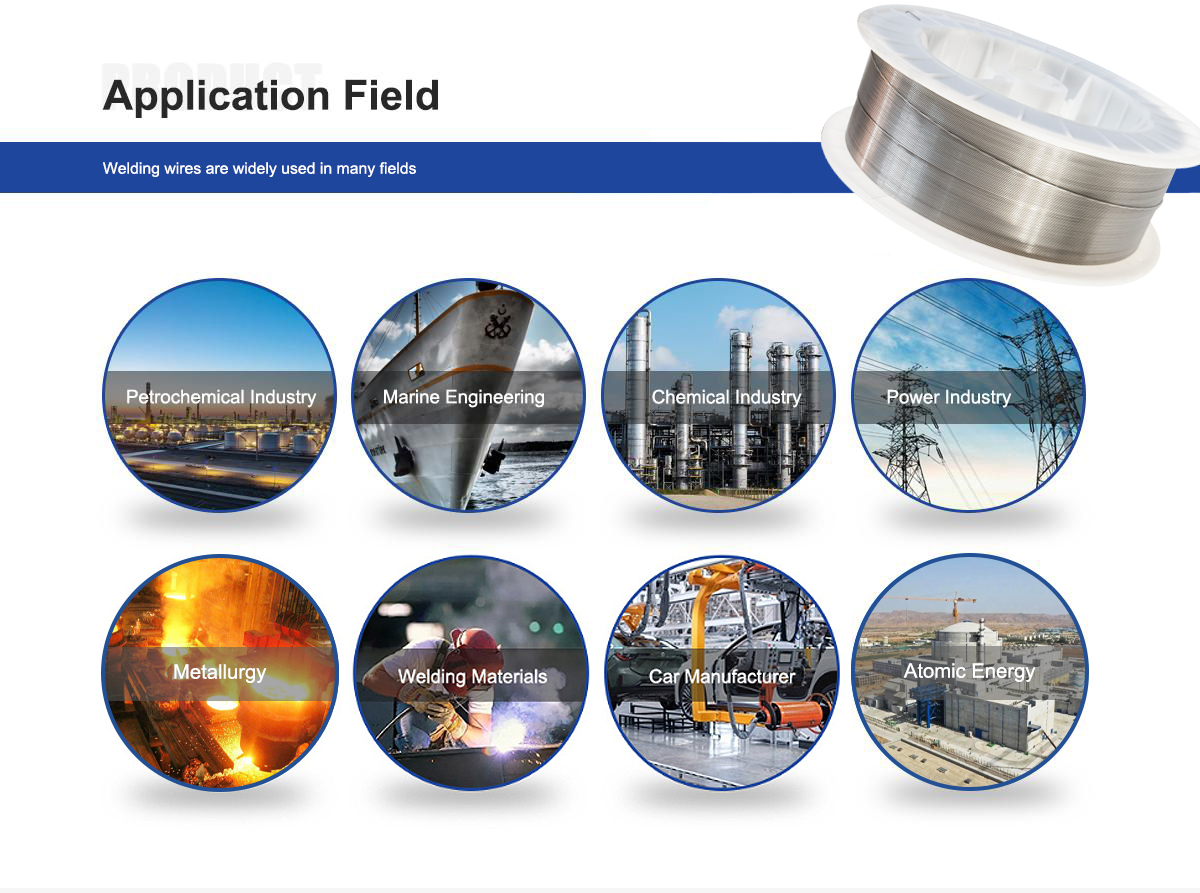
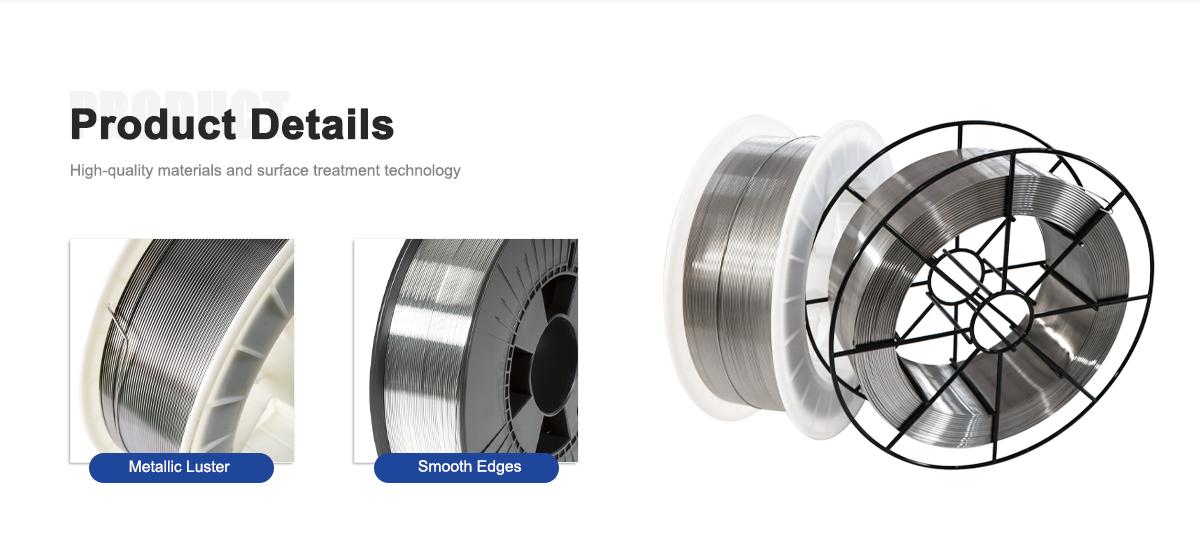
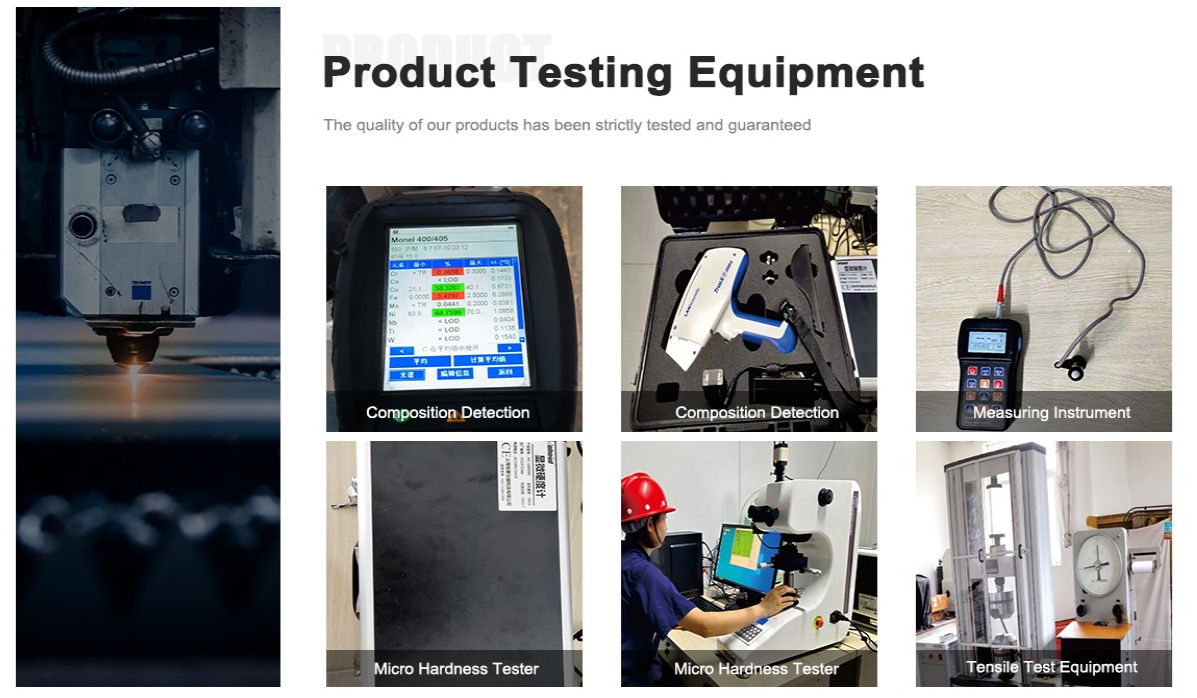
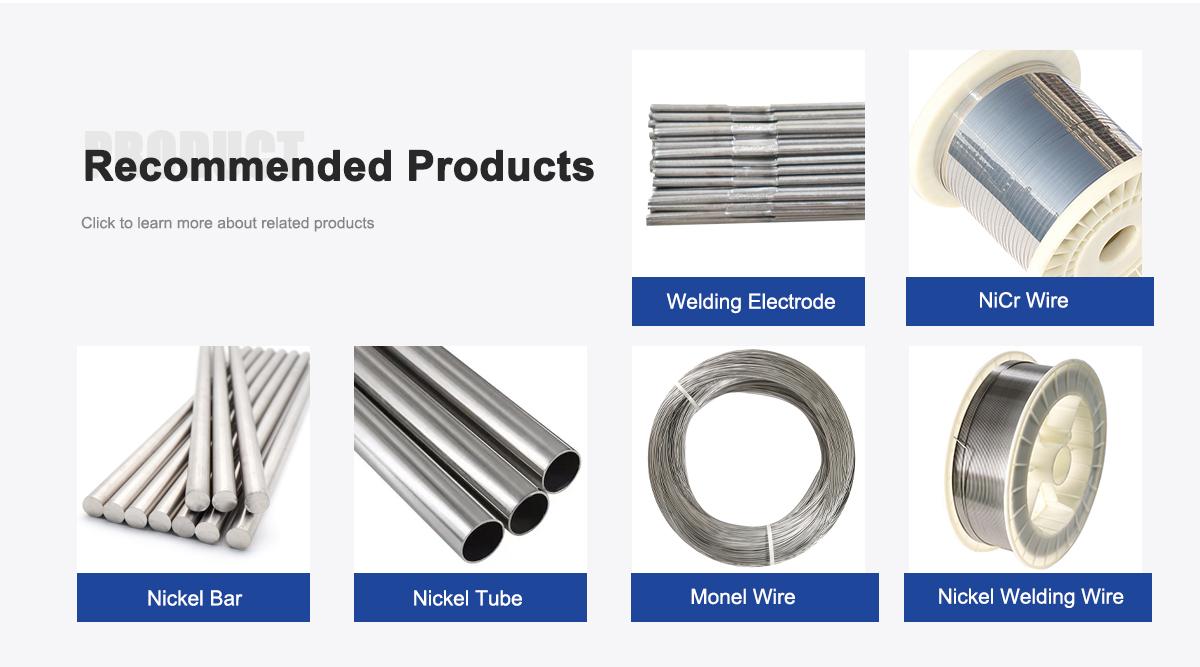
About Us:
Our 12,000㎡ factory is equipped with complete capabilities for research, production, testing, and packaging. We strictly adhere to ISO 9001 standards in our production processes, with an annual output of 1,200 tons. This ensures that we meet both quantity and quality demands. Furthermore, all products undergo rigorous simulated environment testing including high temperature, high pressure, and corrosion tests before being dispatched, ensuring they meet customer specifications. We also provide chemical analysis reports for every FeCrAl alloy, NiCr alloy, and other products purchased.
For all our clients, we offer timely and multilingual after-sales support and technical consulting, helping you resolve any issues swiftly and efficiently.
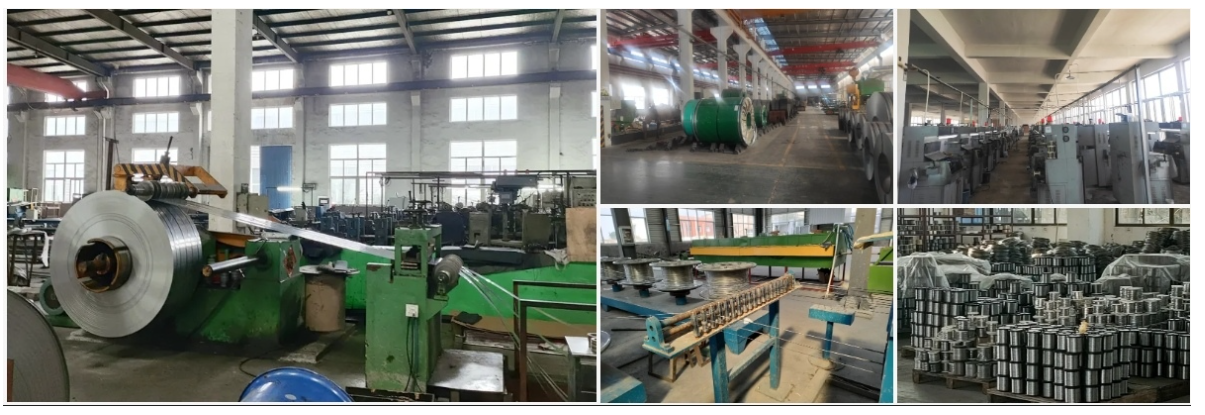
Client Visits
Building Stronger Partnerships
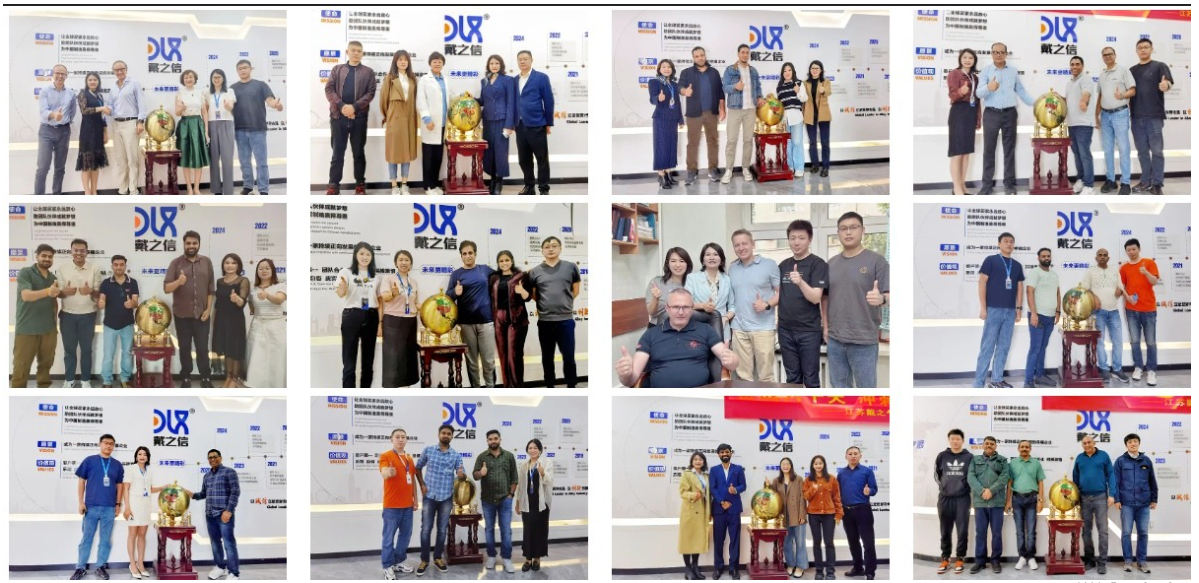
We support all kinds of testing:
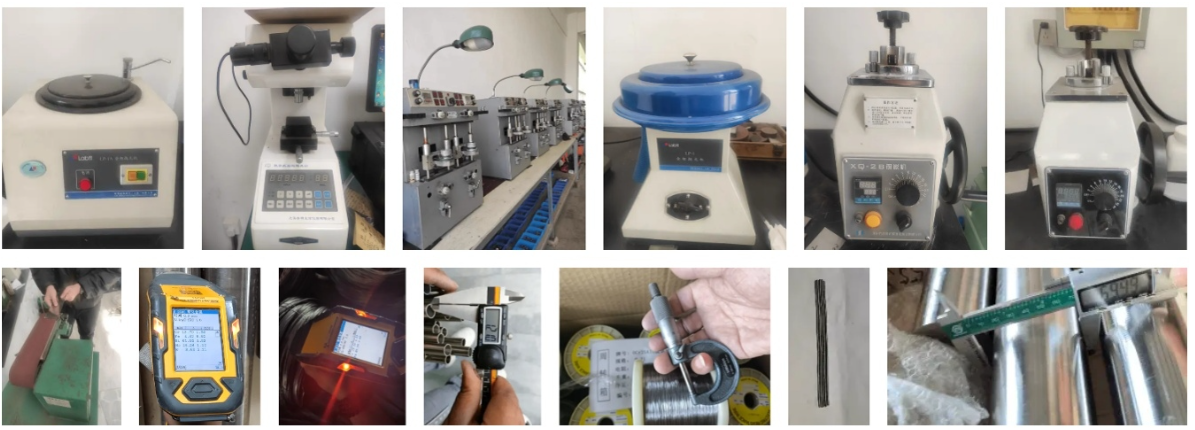

What is ERNiCu-7 Monel 400 welding wire used for?
It’s used for welding nickel-copper alloys in chemical, offshore, and marine applications, offering high-strength, corrosion-resistant welds.
What makes ERNiCu-7 stand out?
Its high copper and low carbon content ensure superior corrosion resistance and weld strength in seawater and acidic environments.
Can it weld dissimilar metals?
Yes, it’s ideal for joining Monel 400 to stainless steel, carbon steel, or other nickel-based alloys.
Which industries benefit from ERNiCu-7?
Chemical processing, offshore oil and gas, desalination, marine, and power generation rely on its durability.
What welding processes is it compatible with?
It’s optimized for MIG and TIG welding, but also supports other arc welding processes.
How does it perform in corrosive environments?
It offers excellent resistance to pitting, crevice, and stress corrosion in seawater and acidic conditions.
Is it suitable for high-temperature applications?
Yes, it performs reliably up to 1000°F (538°C) in corrosive environments.
Does it require special welding techniques?
No, but using our recommended parameters ensures optimal weld quality and minimal defects.